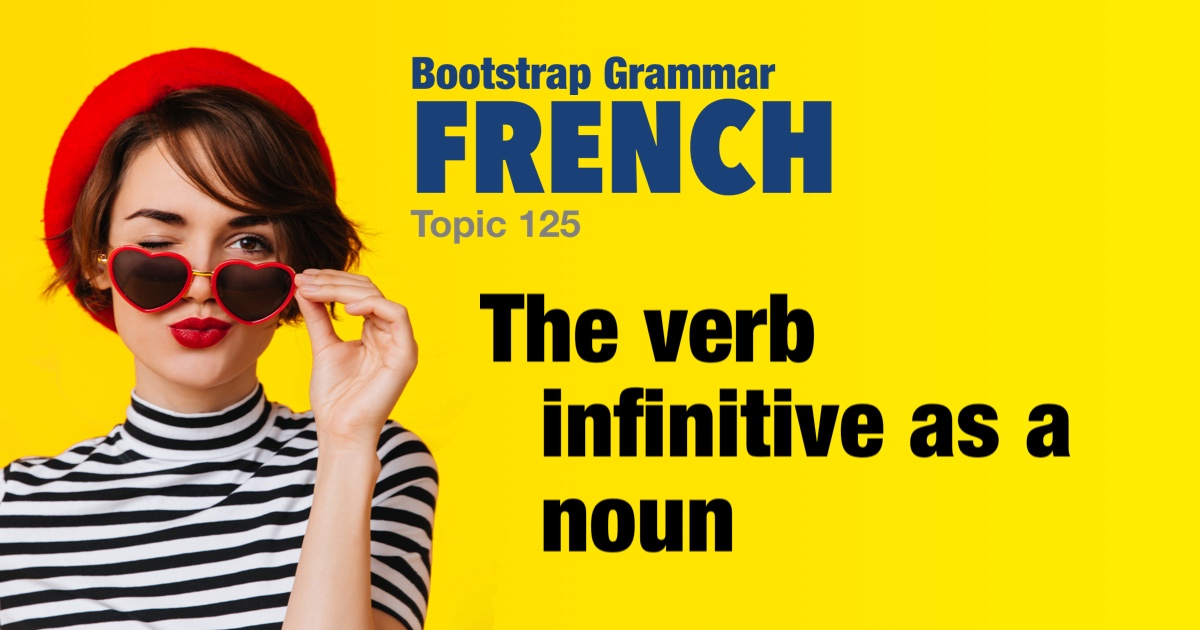French grammar - The verb infinitive as a noun |
|||
|
|||
In English we typically use the gerund in order to talk about a verb as if it were a noun. For example: 'Playing tennis is fun' where 'playing' is the gerund ('the action of playing') and can be the subject of a sentence. But in English we can also say 'To play tennis is fun' where the verb infinitive ('to play') is used. French takes latter approach. That is, we use the infinitive when the verb is a noun. The verb as a noun can be either the subject or object of another verb. In this context it is common to see subject repetition (using c'est). It is also possible to use the infinitive as the subject of a subordinate clause. The 'noun' can be negated as we saw previously - by putting the entire negating pair ne pas (or ne rien etc.) before the infinitive or noun. |
| Examples: | |
|
Jouer au tennis est amusant.
Playing tennis is fun.
|
|
|
Jouer devant le roi fait peur.
Performing in front of the king is scary.
|
|
|
Danser dans le noir, c'est le paradis.
Dancing in the dark - it is heaven.
|
|
|
Voyager seul peut être dangereux.
Traveling alone can be dangerous.
|
|
|
Cuisiner, c'est un art.
Cooking - it is an art.
|
|
|
Dire la vérité est important.
Telling the truth is important. |
|
|
Le connaître, c'est l'aimer.
To know him, it is to love him.
|
|
|
Bien manger est bon pour la santé.
Eating well is good for (your) health. |
|
|
Trop boire d'alcool est mauvais pour la santé.
Drinking too much alcohol is bad for (your) health. |
|
|
J'ai vu l'enfant tomber à l'eau.
I saw the child fall into the water.
|
|
|
Il m'a regardé faire la vaisselle.
He watched me do the dishes.
|
|
|
Être en prison n'est pas amusant.
Being in prison is not fun.
|
|
|
Ne pas parler de ça, c'est important.
Not talking about that is important. |
|
|
Ne rien lui dire est important.
Not saying anything to him is important. |
|
|
Ne plus le dire n'est pas facile.
Not saying it anymore is not easy. |
|
|
Ne jamais rien lui dire est important.
Never saying anything to him is important. |
|
|
Être ou ne pas être.
To be or not to be. |
|
|
Voir, c'est croire.
Seeing is believing.
|
|
|
Savoir, c'est pouvoir.
Knowing (knowledge) is ability (power).
|
|
|
Bien manger est bon pour la santé.
Eating well is good for (your) health. |
|
|
Apprendre le japonais n'est pas facile.
Learning Japanese is not easy. |
|
|
Ne pas manger tous tes pois n'est pas une option.
Not eating all your (familiar) peas is not an option. |
|
|
Trouver un emploi n'est pas facile.
Finding a job is not easy.
|
|
|
Ne pas économiser de l'argent est imprudent.
To not save some money is foolish.
|
|
|
Payer 100 euros pour acheter un billet ? Tu blagues !
Paying 100 euros to buy a ticket? You (familiar) are kidding!
|
|
|
Sortir sans manteau en hiver : c'est fou !
Going out without a coat in winter: it's crazy! |
|
|
Parler français - ce n'est pas trop difficile.
Speaking French - it is not too difficult. |
|
|
Partir, c'est mourir un peu.
To leave is to die a little. |
|
|
C'est toujours la même chose, travailler, travailler et encore travailler.
It's always the same thing, work, work and more work. |
|
|
Travailler avec Joséphine me fait grand plaisir.
Working with Josephine gives me great pleasure.
|
|
 |
|


 Or 'To play tennis is fun.'
Or 'To play tennis is fun.'
